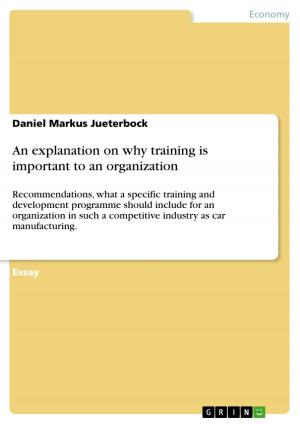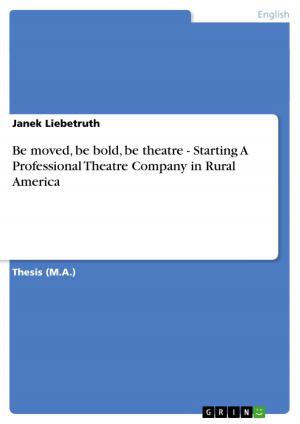Riots and Revolutionaries - How did civil America make progress on its Road to Independence?
How did civil America make progress on its Road to Independence?
Nonfiction, Reference & Language, Study Aids, ESL, Foreign Languages| Author: | Marc Kemper | ISBN: | 9783640215683 |
| Publisher: | GRIN Publishing | Publication: | November 19, 2008 |
| Imprint: | GRIN Publishing | Language: | English |
| Author: | Marc Kemper |
| ISBN: | 9783640215683 |
| Publisher: | GRIN Publishing |
| Publication: | November 19, 2008 |
| Imprint: | GRIN Publishing |
| Language: | English |
Seminar paper from the year 2002 in the subject English Language and Literature Studies - Culture and Applied Geography, grade: 1.7, Humboldt-University of Berlin (Institut für Anglistik und Amerikanistik), course: Einführung in die Ideen- und Sozialgeschichte der USA, 18 entries in the bibliography, language: English, abstract: Nowadays, fighting for freedom is a feeling that most people in the Western World know at best from television. Living in our heated up houses, we have the opportunity to choose for ourselves what we want to believe in, without being persecuted. When you compare the life of previous generations with today's life, it is considerably easier now. In the lecture 'Ideen- und Sozialgeschichte der USA' I heard about people fighting for their own lives, for their families and values. I have been fascinated by the civilians' problems and their ways to solve them. The lecture did not offer so much time to study this special issue in particular, so for my great interest in people's rebellions, I decided to study the role of civilians in the long struggle for independence - from the frustrating acts up to war and beyond. The result is what you are just holding in your hands today. I hope it will help you to understand the enormous pain, anger, and fear the people in the 'New World' suffered from in the second half of the 18th century. At this time, America had been colonised by the British for almost two hundred years (the first Anglican settlement was Jamestown, Virginia, founded in 1607 by Captain John Smith ). At the beginning of the paper's main part, I give a short summary of the important progresses up to the 1760s. In this period of time, I want to go in detail with the people's sorrows upraised by the Crown and its provoking acts. I want to describe two of the deep-cutting acts passed by the English Crown in detail. I chose the so-called Townshend Program, the Tea Act, and the colonist's reactions to them, to arrive in the following part at the beginning of the war, always paying attention to the role of civilians in special. The last part of my paper is meant to show the changes in daily life caused by the revolution, and its results. It should also show us what today's society can learn from previous struggles for freedom and peace. Throughout the paper I proceed in a chronological way. The deepening sections - which are meant to specialise on the most illustrating events and processes involving the common people, or rather on the deeper backgrounds of historical events - must not be necessarily sequential.
Seminar paper from the year 2002 in the subject English Language and Literature Studies - Culture and Applied Geography, grade: 1.7, Humboldt-University of Berlin (Institut für Anglistik und Amerikanistik), course: Einführung in die Ideen- und Sozialgeschichte der USA, 18 entries in the bibliography, language: English, abstract: Nowadays, fighting for freedom is a feeling that most people in the Western World know at best from television. Living in our heated up houses, we have the opportunity to choose for ourselves what we want to believe in, without being persecuted. When you compare the life of previous generations with today's life, it is considerably easier now. In the lecture 'Ideen- und Sozialgeschichte der USA' I heard about people fighting for their own lives, for their families and values. I have been fascinated by the civilians' problems and their ways to solve them. The lecture did not offer so much time to study this special issue in particular, so for my great interest in people's rebellions, I decided to study the role of civilians in the long struggle for independence - from the frustrating acts up to war and beyond. The result is what you are just holding in your hands today. I hope it will help you to understand the enormous pain, anger, and fear the people in the 'New World' suffered from in the second half of the 18th century. At this time, America had been colonised by the British for almost two hundred years (the first Anglican settlement was Jamestown, Virginia, founded in 1607 by Captain John Smith ). At the beginning of the paper's main part, I give a short summary of the important progresses up to the 1760s. In this period of time, I want to go in detail with the people's sorrows upraised by the Crown and its provoking acts. I want to describe two of the deep-cutting acts passed by the English Crown in detail. I chose the so-called Townshend Program, the Tea Act, and the colonist's reactions to them, to arrive in the following part at the beginning of the war, always paying attention to the role of civilians in special. The last part of my paper is meant to show the changes in daily life caused by the revolution, and its results. It should also show us what today's society can learn from previous struggles for freedom and peace. Throughout the paper I proceed in a chronological way. The deepening sections - which are meant to specialise on the most illustrating events and processes involving the common people, or rather on the deeper backgrounds of historical events - must not be necessarily sequential.















